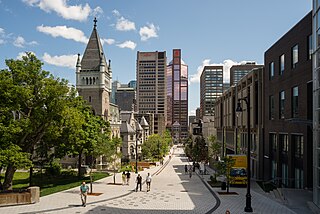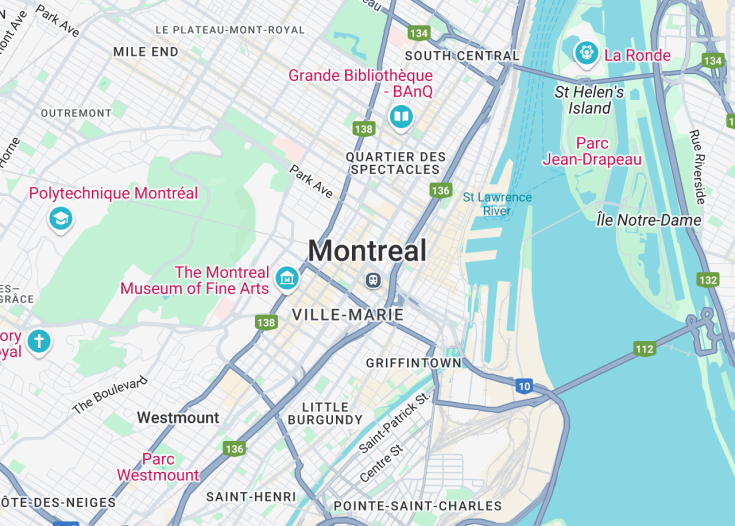Montreal, a vibrant city in the heart of Quebec, Canada, blends the charm of Old Europe with a modern, cosmopolitan buzz. Renowned for its rich history, Montreal boasts stunning architecture like the Gothic Revival Notre-Dame Basilica. Cultural enthusiasts will revel in its myriad of museums, galleries, and live music scenes, especially during world-famous festivals such as the Montreal Jazz Festival. Foodies will find delight in culinary adventures, featuring everything from traditional Quebecois fare to innovative dining experiences. With its bilingual fabric, multicultural inhabitants, and lush green spaces like Mount Royal, Montreal offers a unique urban experience that captivates and delights.
Explore diverse neighborhoods, from the historic charms of Old Montreal to the artsy vibes of Le Plateau. Each district tells a part of Montreal’s rich tapestry.
For a truly local experience, visit during fall to enjoy the vibrant foliage in the city parks and partake in local harvest festivals.
Top things to do & see in Montreal
Select the following sights and activities to discover best tickets and tours available in Montreal.
Montreal: A Cultural Hub of Canada
| Country | Canada |
| Time in Montreal | GMT-5 |
| Language spoken | French |
| Population | 4,291,732 (Source: Montreal Metropolitan Community) |
| Currency | Canadian Dollar (CAD $) |
| Airports |
|
A vibrant city located in Quebec, Montreal boasts a rich blend of history and modernity. Renowned for its stunning architecture and broad streets, the city attracts millions for its culture, cuisine and numerous festivals. The blend of English and French influences is evident in the city’s diverse neighborhoods and the language spoken by its residents. Montreal’s strategic location on the Island of Montreal at the conjunction of the Saint Lawrence and Ottawa Rivers was historically significant for trade and development. Today, it remains a central hub for commerce, aerospace, and technology industries.
Where is Montreal?
Located in the province of Quebec, Montreal sits on an island in the Saint Lawrence River in eastern Canada.
Distances:
| Route | Distance by car | Time by car |
|---|---|---|
| Toronto to Montreal | 335 miles | 5 hours 30 minutes |
| Ottawa to Montreal | 123 miles | 2 hours |
| Quebec City to Montreal | 158 miles | 2 hours 50 minutes |
What is Montreal famous for?
Montreal is famous for its vibrant festivals like the Montreal International Jazz Festival, stunning historical sites such as Notre-Dame Basilica, and as the headquarters of the International Civil Aviation Organization.
History
Pre-colonial Era – 14th Century
Before European contact, the area now known as Montreal was inhabited by the St. Lawrence Iroquoians, a group of indigenous people who lived in the region. These native people were primarily engaged in farming, fishing, and trading. They had developed a prosperous society, with villages structured around maize cultivation and social structures that included complex governance systems.
1535-1642 – European Discovery and Settlement
The French explorer Jacques Cartier was the first European to set foot on the island of Montreal in 1535. He claimed it for France but did not establish a permanent settlement. In 1642, Paul de Chomedey, Sieur de Maisonneuve, founded a permanent mission called Ville-Marie, which later became known as Montreal. The early years were challenging, marked by conflict with indigenous groups, harsh winters, and disease.
1760-1867 – British Rule and Growth
Following the defeat of the French in the Seven Years’ War, Montreal came under British rule in 1760. During this period, Montreal experienced growth as a trade and commercial hub, facilitated by its strategic location along the St. Lawrence River. The construction of the Lachine Canal in 1825 boosted its industrial economy, leading to a boom in population and infrastructure development.
1867-Present – Modern Developments
With Confederation in 1867, Montreal became a part of the newly formed Canada. The 20th century saw significant immigration, making it a cosmopolitan city rich in cultural diversity. Montreal hosted the World Expo in 1967 and the Summer Olympics in 1976, marking its status on the world stage. The city continued to grow in the late 20th and early 21st centuries, with developments in technology, culture, and education, becoming one of Canada’s most important urban centers.
Visit Montreal
What to see and do in Montreal
Montreal, a city known for its vibrant culture and rich history, offers a wide array of attractions and activities. Visit the historic Notre-Dame Basilica in Old Montreal, a masterpiece of Gothic Revival architecture. Explore the cobblestone streets lined with boutiques and restaurants.
For art lovers, the Montreal Museum of Fine Arts provides an impressive collection of works. Outdoors enthusiasts will enjoy Mount Royal Park, designed by Frederick Law Olmsted, which offers paths for walking and biking, along with stunning views of the city skyline. Finally, don’t miss the chance to taste Montreal’s famous bagels and poutine.
Annual Events in Montreal
Montreal is home to numerous recurring events throughout the year. The Montreal International Jazz Festival, one of the largest jazz festivals in the world, takes place in June and July. The Just for Laughs Festival, happening every July, is a must-see for comedy enthusiasts.
Film buffs will appreciate the Montreal World Film Festival in August. Winter brings the magical Montreal en Lumière in February, combining art, gastronomy, and outdoor activities.
Best time to visit Montreal
The best time to visit Montreal depends largely on your interests. Summer (June to August) offers warm temperatures and a host of festivals, making it ideal for those who enjoy outdoor concerts and cultural gatherings. However, fall (September to November) is also a great time to visit, with cooler temperatures, fewer tourists, and spectacular autumn foliage.
Winter sports enthusiasts will find winter (December to February) perfect for experiencing the city’s snowy charm and partaking in activities like ice skating and cross-country skiing in nearby parks.
Is Montreal worth visiting?
Montreal is undoubtedly worth visiting for its unique blend of history, culture, and modernity. The city’s rich cultural tapestry is reflected in its diverse culinary scenes, vibrant arts, and myriad festivals. However, the weather can be a challenge; winters are particularly harsh and may not appeal to everyone.
Additionally, while the city is largely bilingual, navigating Montreal with limited French knowledge might be difficult for some tourists. Despite these factors, the city’s charm, bustling cosmopolitan life, and warm, welcoming residents make it a captivating destination for travelers.










